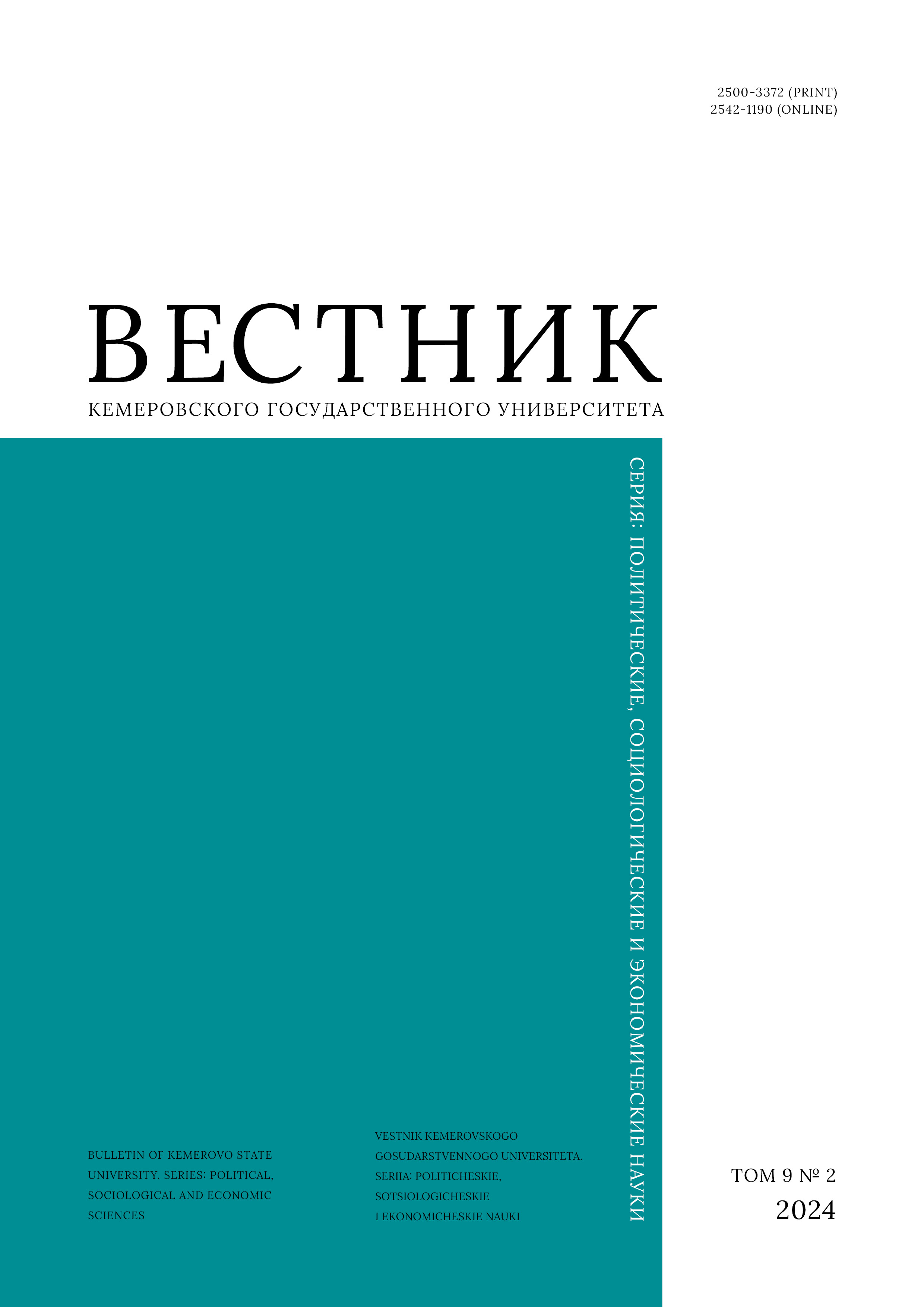Novokuznetsk, Russian Federation
The article introduces a cultural and historical pattern of professional identification in young people of Russian mentality. Some national features of professional identification can be characterized as non-obvious due to the multi-structural and multi-vector civilizational orientations of the Russian state. The list of obvious axiological national characteristics includes collectivism, risk aversion, high power distance, sacredness of authorities, relief, mercy, religion-induced compassion, and violations of rules. Phenomenologically speaking, national mentality is a dynamic foundation formed by a set of axiological, cognitive, motivational, and behavioral determinants shared by most members of a particular cultural and historical community. It manifests itself as a broad continuum of political, socio-economic, and cultural conditions that are reflected in formal and informal institutions. Deep cultural structures define the collective and individual actor of professional identification: they fix the results of interiorization and mediation. They manifest themselves as social projections on the education system in its cultural, historical, social, legal, and economic relations. National mentality sets the vector of preferences for the subject, content, professional activity, employment, and working conditions. It makes it possible to analyze the intentions of optants regarding the development of the nomenclature and structure of professional skills during the civilizational shift. The shift is happening in the industry and technology but it aggregates axiological, motivational, and cognitive attitudes of citizens to the standards of collectivism or individualism, as well as to Western, Eastern, or mixed behavioral patterns.
mentality, national mentality, structure of mentality, civilizational transformation, conceptualization, Western civilization, Eastern civilization
1. Minenko A. G. Russian national character: The main approaches to the study. Idei i idealy, 2012, 2(3): 86–97. (In Russ.) https://www.elibrary.ru/pekvdb
2. Kashaev V. E. National character: Experience of philosophical research. Ivanovo: IvSU, 2000, 141. (In Russ.)
3. Isaenko V. P., Smirnov D. V. Components of Russian mentality. Bulletin of the academy of children's and youth tourism and local lore, 2018, (3): 7–20. (In Russ.) https://www.elibrary.ru/rguiaq
4. Borzova E. P., Lebedev S. P. Russian character, orthodox cultural code and mentality of the Russian people. Vestnik Russkoi khristianskoi gumanitarnoi akademii, 2021, 22(4-2): 145–162. (In Russ.) https://www.elibrary.ru/ttdcjh
5. Anikeeva E. N., Semushkin L. V. Dialogue of civilizations: East – West. Voprosy filosofii, 1998, (2): 173–177. (In Russ.)
6. Yurevich A. V. The structural elements of national mentality. Psikhologicheskie issledovaniia, 2013, 6(29). (In Russ.) https://doi.org/10.54359/ps.v6i29.702
7. Zatepyakin O. A., Pyankova L. A., Grekova N. Yu. Stimulation of Labor Activity. Novokuznetsk: SibSIU, 2021, 183. (In Russ.)
8. Toffler E. The Third Wave. Moscow: AST, 2009, 795. (In Russ.) https://www.elibrary.ru/qokocn
9. Bell D. The coming post-industrial society: A venture of social forecasting. Moscow: Academia, 2004. 944. (In Russ.) https://elibrary.ru/qocvvp
10. Mudrik A. V. Introduction to Social Pedagogy. Moscow: Institut prakticheskoi psikhologii i psikhoanaliza, 1997, 365. (In Russ.) https://elibrary.ru/tnpjlh
11. Kliuchevskii V. O. Historical portraits. Moscow: Pravda, 1990, 622. (In Russ.)
12. Mischenko V. A. National mentality as a special factor to form professional mobility. Siberian Pedagogical Journal, 2010, (8): 128–135. (In Russ.) https://www.elibrary.ru/peurfd
13. Inglehart R., Oyserman D. Individualism, autonomy, self-expression: The human development syndrome. International Studies in Sociology and Social Anthropology, 2004, 74–96. https://doi.org/10.1163/9789047412977_008
14. Magun V. S., Rudnev M. G., Shmidt P. Russian basic human values through the lens of the european value types. The Russian public opinion herald. Data. Analysis. Discussion, 2015, (3-4): 74–93. (In Russ.) https://doi.org/10.24411/2070-5107-2015-00020
15. Ionova E. V. The attitude of Russians to values of the Western culture (on materials of Astrakhan). Vestnik Saratovskogo gosudarstvennogo tekhnicheskogo universiteta, 2008, (32): 248–252. (In Russ.) https://www.elibrary.ru/jtwmmf
16. Semeko G. V. The main trends in the field of training economists in Russia (1990–2005). Economic and social problems of Russia, 2006, (1): 129–147. (In Russ.) https://www.elibrary.ru/huapij
17. Krasnopevtseva I. V. Disproportions in terms of occupations in the skilled labour market. Vestnik of Lobachevsky University of Nizhni Novgorod, 2013, (3-1): 315–321. (In Russ.) https://www.elibrary.ru/rapxdv
18. Gamidova N. V. Globalization and youth mentality. Society and Law, 2016, (2): 337–341. (In Russ.) https://www.elibrary.ru/wibzet
19. Dvorjadkina E. B., Efimova E. G. Regional system of vocational education: Concept and essence (on an example of an industrial region). Regional economy and management, 2018, (3). (In Russ.) URL: https://eee-region.ru/article/5513/ (accessed 02.01.2023). https://www.elibrary.ru/yajgqh
20. Zatepyakin O. A., Kazantseva G. G., Ivanova E. V., Domnyshev A. V. Ecosystem approach to the regional professional potential formation in the digital transformation conditions. Human Progress, 2022, 8(1). (In Russ.) https://doi.org/10.34709/IM.181.7
21. Sadovaya E. S., Sautkina V. A., Zenkov A. R. Formation of a new social reality: Technological challenges. Moscow: IMEMO, 2019, 190. (In Russ.) https://doi.org/10.20542/978-5-9535-0564-2
22. Lysenko V. G., Kharina N. V., Iankin D. V. Features of career guidance work with students in new socio-economic conditions. Advanced professional training of personnel in the conditions of an educational and technological cluster for the socio-economic development of the region: Proc. Interreg. Sci.-Prac. Conf., Tomsk, 19 Dec 2019. Novosibirsk: Zolotoi kolos, 2019, 101–108. (In Russ.) https://elibrary.ru/yslzyl
23. Fominskaya M. D. Correlation between faith and intellect in post-secular world: "Return" of religious problems to the Western philosophical and legal discourse. Philosophiya Prava, 2015, (1): 7–11. (In Russ.) https://www.elibrary.ru/tniodh
24. Zubareva K. A. Openness as a phenomenon of modern education. Pedagogical education in Russia, 2012, (3): 6–10. (In Russ.) https://www.elibrary.ru/pbhfnn
25. Baksansky O. E. World view of the future: Convergence as a fundamental principle. Pedagogy and education, 2014, (3): 17–29. (In Russ.) https://doi.org/10.7256/2306-434X.2014.3.13521
26. Maksimenko A. A. Russian management practices in the context of the value-rational approach. Fragment 2. Theory and Practice of Social Development, 2013, (10): 83–89. (In Russ.) https://www.elibrary.ru/refxwd
27. Lapin N. I. Modernization of the basic values of Russians. Sotsiologicheskie issledovaniya, 1996, (5): 3–23. (In Russ.) https://elibrary.ru/mouhoh
28. Burykin E. S. Ratio of the rational and the intuitive in making an optimal management decision. Vestnik Moskovskogo finansovo-iuridicheskogo universiteta, 2022, (2): 190–201. (In Russ.) https://doi.org/10.52210/2224669X_2022_2_190
29. Pisanova T. V. Modern projects of national and cultural identity in CIS countries partners. Vestnik of Moscow State Linguistic University. Humanities, 2018, (1): 200–215. (In Russ.) https://www.elibrary.ru/xqrotj

















